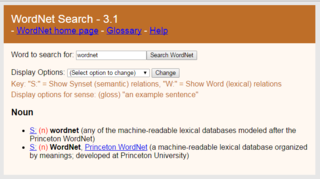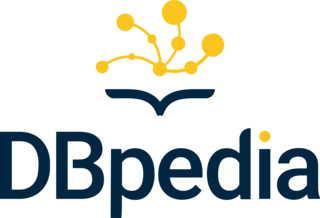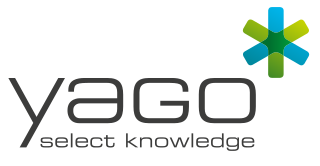
WordNet is a lexical database of semantic relations between words that links words into semantic relations including synonyms, hyponyms, and meronyms. The synonyms are grouped into synsets with short definitions and usage examples. It can thus be seen as a combination and extension of a dictionary and thesaurus. While it is accessible to human users via a web browser, its primary use is in automatic text analysis and artificial intelligence applications. It was first created in the English language and the English WordNet database and software tools have been released under a BSD style license and are freely available for download from that WordNet website. There are now WordNets in more than 200 languages.
Open Mind Common Sense (OMCS) is an artificial intelligence project based at the Massachusetts Institute of Technology (MIT) Media Lab whose goal is to build and utilize a large commonsense knowledge base from the contributions of many thousands of people across the Web. It has been active from 1999 to 2016.
An annotation is extra information associated with a particular point in a document or other piece of information. It can be a note that includes a comment or explanation. Annotations are sometimes presented in the margin of book pages. For annotations of different digital media, see web annotation and text annotation.
A semantic wiki is a wiki that has an underlying model of the knowledge described in its pages. Regular, or syntactic, wikis have structured text and untyped hyperlinks. Semantic wikis, on the other hand, provide the ability to capture or identify information about the data within pages, and the relationships between pages, in ways that can be queried or exported like a database through semantic queries.

Semantic MediaWiki (SMW) is an extension to MediaWiki that allows for annotating semantic data within wiki pages, thus turning a wiki that incorporates the extension into a semantic wiki. Data that has been encoded can be used in semantic searches, used for aggregation of pages, displayed in formats like maps, calendars and graphs, and exported to the outside world via formats like RDF and CSV.
Simple Knowledge Organization System (SKOS) is a W3C recommendation designed for representation of thesauri, classification schemes, taxonomies, subject-heading systems, or any other type of structured controlled vocabulary. SKOS is part of the Semantic Web family of standards built upon RDF and RDFS, and its main objective is to enable easy publication and use of such vocabularies as linked data.
Ontotext is a software company with offices in Europe and USA. It is the semantic technology branch of Sirma Group. Its main domain of activity is the development of software based on the Semantic Web languages and standards, in particular RDF, OWL and SPARQL. Ontotext is best known for the Ontotext GraphDB semantic graph database engine. Another major business line is the development of enterprise knowledge management and analytics systems that involve big knowledge graphs. Those systems are developed on top of the Ontotext Platform that builds on top of GraphDB capabilities for text mining using big knowledge graphs.

In computing, linked data is structured data which is interlinked with other data so it becomes more useful through semantic queries. It builds upon standard Web technologies such as HTTP, RDF and URIs, but rather than using them to serve web pages only for human readers, it extends them to share information in a way that can be read automatically by computers. Part of the vision of linked data is for the Internet to become a global database.

DBpedia is a project aiming to extract structured content from the information created in the Wikipedia project. This structured information is made available on the World Wide Web. DBpedia allows users to semantically query relationships and properties of Wikipedia resources, including links to other related datasets.
NEPOMUK is an open-source software specification that is concerned with the development of a social semantic desktop that enriches and interconnects data from different desktop applications using semantic metadata stored as RDF. Between 2006 and 2008 it was funded by a European Union research project of the same name that grouped together industrial and academic actors to develop various Semantic Desktop technologies.

The history of wikis began in 1994, when Ward Cunningham gave the name "WikiWikiWeb" to the knowledge base, which ran on his company's website at c2.com, and the wiki software that powered it. The wiki went public in March 1995, the date used in anniversary celebrations of the wiki's origins. c2.com is thus the first true wiki, or a website with pages and links that can be easily edited via the browser, with a reliable version history for each page. He chose "WikiWikiWeb" as the name based on his memories of the "Wiki Wiki Shuttle" at Honolulu International Airport, and because "wiki" is the Hawaiian word for "quick".
Freebase was a large collaborative knowledge base consisting of data composed mainly by its community members. It was an online collection of structured data harvested from many sources, including individual, user-submitted wiki contributions. Freebase aimed to create a global resource that allowed people to access common information more effectively. It was developed by the American software company Metaweb and run publicly beginning in March 2007. Metaweb was acquired by Google in a private sale announced on 16 July 2010. Google's Knowledge Graph is powered in part by Freebase.

YAGO is an open source knowledge base developed at the Max Planck Institute for Informatics in Saarbrücken. It is automatically extracted from Wikipedia and other sources.
Knowledge extraction is the creation of knowledge from structured and unstructured sources. The resulting knowledge needs to be in a machine-readable and machine-interpretable format and must represent knowledge in a manner that facilitates inferencing. Although it is methodically similar to information extraction (NLP) and ETL, the main criterion is that the extraction result goes beyond the creation of structured information or the transformation into a relational schema. It requires either the reuse of existing formal knowledge or the generation of a schema based on the source data.
GeoSPARQL is a standard for representation and querying of geospatial linked data for the Semantic Web from the Open Geospatial Consortium (OGC). The definition of a small ontology based on well-understood OGC standards is intended to provide a standardized exchange basis for geospatial RDF data which can support both qualitative and quantitative spatial reasoning and querying with the SPARQL database query language.

UMBEL is a logically organized knowledge graph of 34,000 concepts and entity types that can be used in information science for relating information from disparate sources to one another. It was retired at the end of 2019. UMBEL was first released in July 2008. Version 1.00 was released in February 2011. Its current release is version 1.50.
In natural language processing, linguistics, and neighboring fields, Linguistic Linked Open Data (LLOD) describes a method and an interdisciplinary community concerned with creating, sharing, and (re-)using language resources in accordance with Linked Data principles. The Linguistic Linked Open Data Cloud was conceived and is being maintained by the Open Linguistics Working Group (OWLG) of the Open Knowledge Foundation, but has been a point of focal activity for several W3C community groups, research projects, and infrastructure efforts since then.

In knowledge representation and reasoning, a knowledge graph is a knowledge base that uses a graph-structured data model or topology to represent and operate on data. Knowledge graphs are often used to store interlinked descriptions of entities – objects, events, situations or abstract concepts – while also encoding the semantics or relationships underlying these entities.

Jens Lehmann is a computer scientist, who works with knowledge graphs and artificial intelligence. He is a principal scientist at Amazon, an honorary professor at TU Dresden and a fellow of European Laboratory for Learning and Intelligent Systems. Formerly, he was a full professor at the University of Bonn, Germany and lead scientist for Conversational AI and Knowledge Graphs at Fraunhofer IAIS.








